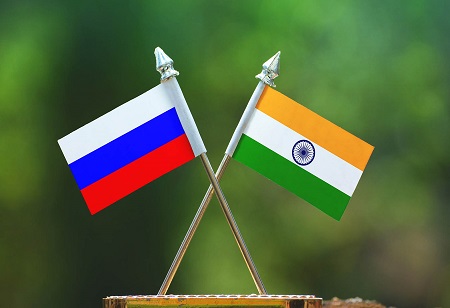
India-Russia Trade Set A Record Of $39.8 Billion In 2022-23

 India is emerging as a key supplier of medicines, car and machine parts, textiles and clothing, and food products to Russia, said Aleksey Valkov, director of the St. Petersburg International Economic Forum (SPIEF), who organised a mega Indo-Russia business meeting in Delhi.
India is emerging as a key supplier of medicines, car and machine parts, textiles and clothing, and food products to Russia, said Aleksey Valkov, director of the St. Petersburg International Economic Forum (SPIEF), who organised a mega Indo-Russia business meeting in Delhi.
India-Russia trade hit a record $39.8 billion in 2022–23, Valkov added.
The surge in bilateral trade came in the backdrop of India’s huge purchase of discounted Russian oil.
“Indian business has the opportunity to fill vacancy in other sectors of the Russian economy after withdrawal of Western firms,” Valkov said, pointing to five core areas of potential cooperation – transport infrastructure, agriculture and agro-processing, support for small and medium enterprises (SMEs), digital transformation and cutting-edge technologies, and manufacturing and trading.
Russia became one of India’s top five trading partners for the first time, Valkov said as he invited Indian firms to take part in SPIEF. “Visa is easy to obtain and SPIEF participants can not only engage in business but also get taste of Russian hospitality.”
He said India is already supplying Russia with medicines, car and machine parts, textiles and clothing, and food products. In the food sector, Russia is importing tea and coffee, rice, fruits, seafood and confectionery from India.
Russia’s exports to India include mineral oils and fuels, mineral resources, precious stones and metals, fertilisers, project goods, vegetable oils, rubber and rubber products, paper and cardboard, iron and steel, inorganic chemicals, plastic products and pharmaceuticals.
Besides, 120 Vande Bharat Trains will be made in a joint venture between Russian firm JSC Metrovagonmash-Mytishchi and RVNL coach factory plant in Latur.
On the issue of a newly established rupee-rouble mechanism for trade settlements, the SPIEF director said transactions in national currencies promote sovereignty. “Our continued joint work to support mutual settlements in national currencies will help reduce costs and save time, as well as lower certain risks associated with payments,” he said.
On the upcoming 26th SPIEF in St. Petersburg on June 14-17 where Prime Minister Narendra Modi was the chief guest a few years ago, Valkov said, “Participants have the opportunity to negotiate with representatives of federal ministries as well as companies across numerous sectors.”
The two countries are also exploring digitisation of the INSTC corridor for smooth and faster trade via Iran. India and Russia are also expanding their maritime connectivity via the Vladivostok-Chennai corridor and Arctic region.